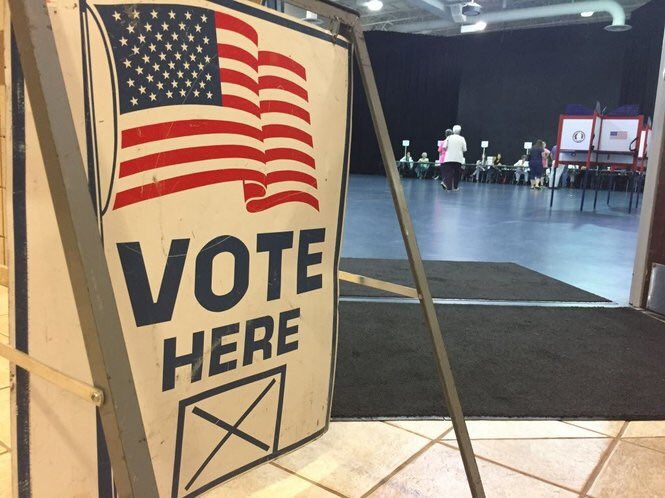On January 29, we discussed the relationship between
religion and politics in the United States. On that occasion, we called attention to the role played by neo-Pentecostal evangelical denominations and by televangelism as elements that have become relevant in the country's political disputes. We also mentioned that a more conservative social behavior has brought this segment closer to the Republican Party.
Another fact to consider is the increase in the demographic weight of the Hispanic population in the United States, as we discussed in our first analysis, on October 14, 2021, in which we analyzed the
Latino population in the US. According to a 2020
Pew Research Center survey “In all 50 states, the share of non-Hispanic White eligible voters declined between 2000 and 2018, with 10 states experiencing double-digit drops in the share of White eligible voters. During that same period, Hispanic voters have come to make up increasingly larger shares of the electorate in every state. These gains are particularly large in the Southwestern U.S., where states like Nevada, California and Texas have seen rapid growth in the Hispanic share of the electorate over an 18-year period. These trends are also particularly notable in battleground states – such as Florida and Arizona – that are likely to be crucial in deciding the 2020 election.2 In Florida, two-in-ten eligible voters in 2018 were Hispanic, nearly double the share in 2000. And in the emerging battleground state of Arizona, Hispanic adults made up about one-quarter (24%) of all eligible voters in 2018, up 8 percentage points since 2000”.
The scenario reveals the relative decrease of the white population in the country and can be encouraging news for the leaders of the Democratic Party, a group that traditionally attracts the sympathy of ethnic minorities, particularly African-Americans and Latinos. Considering the historical trend that by 2050 the percentage of Latinos will reach 25% of the population, it would be reasonable to assume that there would be greater support from this group for Democrats, who have been losing influence among the white population of states with less urbanization.
However, when considering the growth of the movement of evangelical sectors and their more conservative positions, especially among Latino communities, the situation for Democrats does not seem to be comfortable. Issues related to the customs agenda, such as abortion rights, same-sex marriage and, more recently, the so-called “Critical Racial Theory” are leading the electorate to a position closer to the Republican Party. The unexpected victory of Republican Glenn Youngkin in the 2021 elections for governor of Virginia is quite symptomatic, he focused his speech on the customs agenda, on health measures to face Covid-19 and on education, where he harshly rejected teaching. of critical racial theory, precisely because of something that bothers the white majority by revealing the characteristics of structural racism in the United States. The setback was even more felt for Democrats as Biden won the state's 2020 election by a 9-percentage point advantage.
Republicans have gained ground by managing to instill in part of the population the idea that Democrats are socialists, contrary to “American values” and defenders of agendas that attack the traditional family. In fact, there are parts of the Democratic Party on the front line for human rights, such as the free expression of people about their own sexuality, same-sex marriage, women's reproductive rights, the denunciation of structural racism and the struggle for labor rights, etc. However, more conservative parties see this stance as an aggression to their values, hence the support for Republicans and Trump, particularly since this has never been a model of Christian piety.
Here on our portal we have already highlighted that the neutral gender “Latinx” is not well regarded by most of the Latino/Hispanic community, but it is widely used by the most progressive sectors of the Latin social movement and by the democratic left, in general.
An interesting data brought by the
Los Angeles Times, March 4, 2022, concerns the growth of the number of neo-Pentecostal or evangelical Latins. According to the article: “Catholics no longer make up the majority of the US Latino population. In Pew Research Center RDD (Random Digit Dialing) polls conducted in 2018 and 2019, 47% of Latinos described themselves as Catholic, down from 57% a decade ago. Meanwhile, the share of Latinos who identify as Evangelical Protestants is 16%, and the share of Latinos who say they have no religious affiliation is now 23%, up from 15% in 2009. Many Latinos are becoming politicized through Evangelical churches led by pastors who insist they are not beholden to any party but typically take conservative positions on core issues such as abortion, religious freedom, and same-sex marriage, and are stepping up their activism ahead of national elections in 2022 and 2024”. This information is very important, not only because of the conversion of some Catholics to Evangelicals, but also because the influence of evangelical churches is growing in Central and South American countries. Still on the issue of Christian traditionalism, one cannot forget the influence of conservative Catholic currents, such as the primacy of Opus Dei, very influential in the United States.
This clash between ideological currents among the Latino electorate can be exemplified by the dispute in the 28th District of Texas, which stretches from the city of San Antonio to Laredo, in the Rio Grande Valley, where
Latinos form the absolute majority of the population. It is a district that traditionally elects a Democratic congressman, but Joe Biden won a narrow victory over Donald Trump, from 51.6% to 47.2%, which indicates that a considerable part of Latinos opted for the Republican candidate.
In the Democratic primary, on one side was Henry Cuellar, 66, the current representative in his ninth term. On the other, 28-year-old Jessica Cisneros. Cuellar is seen as a traditional politician with very conservative ideas, markedly opposed to abortion. Cisneros, on the other hand, mirrors the progressive-minded congresswoman Alexandria Ocasio-Cortez, who managed to win the 2018 Bronx district caucus against a traditional establishment politician from her party. In the primaries held on March 1st, none of the candidates won a majority of votes. Cuellar obtained 48.4% and Cisneros 46.9%, but the number of votes obtained by the candidate was surprising, considering the disparity of resources between both candidates. The definition of the Democratic name for the Chamber of Deputies will take place through the second round, which is scheduled for May.
In the other field, the definition of the Republican candidacy for the 28th District was also left for the second round. On the one hand, the winner of the first round, Cassy Garcia, with 23.5%. Of Latin origin, she works as deputy state director for Senator Ted Cruz, known for defending the oil industry and being a hardliner in the Senate. On the other, Sandra Whitten, with 18.0%, who declares herself to be a conservative, a woman with a dedicated family and a community leader. It is worth considering that while the Democratic primary was attended by 48,600 people, only 24,900 voted in the Republican primary.
Regarding the previews in the Rio Grande Valley, Texas, it is worth considering the opinion of
Carlos Sanches, which calls attention to the conservatism of the population of this region, which may abandon the traditional democratic influence: “Hispanics who live along the border are much more conservative than Texas Democrats overall. One of the region’s open secrets is the large number of DINOs (Democrat in Name Only) that are in leadership positions. Many officials, locals quietly say, run as Democrats whether they believe in the party platform or not because running as a Republican has generally been the kiss of death. But during the Trump administration, Trump trains or caravans of cars expressing support for the former president became almost commonplace in Hidalgo County, the southern anchor of the 15th district. As one Trump supporter told me, it has become easier to come out of the Republican closet over the past few years with growing numbers of people declaring allegiance to Trump based on economic and border security issues”. By the way, the Republican candidate who won the 15th District primaries, Monica De La Cruz Hernandez, is a favorite to reach the Capitol.
In this sense, the greatest electoral chances in these districts on the border with Mexico are with those that seem to be more conservative than the other more progressive ones.
Biden and the State of the Union Speech
It would be nearly impossible to reflect on U.S. policy without mentioning the impacts caused by the war in Ukraine. That's what we'll do next.
In the
newsletter of January 7th, 2022, we mentioned that “If there is no fortuitous event, like a war or a terrorist attack that boosted George W. Bush's popularity in 2001, the Democrats are unlikely to be able to keep the current benches in the Senate and House of Representatives”. As a result, we warned that the loss of support from Latino voters would have a major bearing on the fate of Democrats in the midterm elections. However, in recent weeks this unexpected event has occurred: the invasion of Ukraine by Russian troops.
The Biden administration's reaction was immediate. He sought to align the position with European partners and instituted a series of sanctions against Russia's economy and authorities. Even the Republican Party sided with the president in the political response against Vladimir Putin's rule, despite the Trumpist Republican wings quietly supporting Russian actions. Today, even Trumpists in Congress are pushing for NATO to take a tougher line.
In this context, the traditional “State of the Union Speech” took place on March 1st, in which Joe Biden devoted a great deal of space to justifying his decisions about the conflict in Ukraine. At one point, Biden said, “Along with twenty-seven members of the European Union, including France, Germany, Italy, as well as countries like the UK, Canada, Japan, Korea, Australia, New Zealand, and many others, even Switzerland. We are inflicting pain on Russia and supporting the people of Ukraine. Putin is now isolated from the world more than ever. Together with our allies, we are now applying powerful economic sanctions. We are cutting Russia's biggest banks from the international financial system. Prevent Russia's central bank from defending the Russian ruble, rendering Putin's $630 billion ‘war fund’ useless. We are obstructing Russia's access to technology that will undermine its economic strength and weaken its military for years to come”.
It should be noted that the U.S. press is in line with the announced sanctions against Russia. The Cold War climate is immediately re-established and the old distrust of the population against the country is exploited. Coverage of the war has highlighted Ukraine's defense actions and the Russian army and Putin have been demonized. The specter of the enemy within again served to unite a very fragmented society.
This was reflected in the popularity of Joe Biden. According to PBS NewsHour/NPR/Marist polls, the Biden administration's approval rating rose 8% after the State of the Union address was broadcast. According to
Laura Santhanam, “Regardless of their age, race, geography, income or politics, most Americans say they back economic sanctions against Russia and are willing to pay higher prices for fuel. But they are also concerned that Russia could use malevolent force beyond neighboring Ukraine and threaten the U.S. and its allies with cyberattacks, nuclear weapons or a broader war”.
The war, as we can see, could have a decisive influence on the November elections, regardless of the movement we have described regarding the displacement of part of the Latin electorate to the republican ranks. The patriotic and national unity discourse can serve as mortar to partially repair a crumbling political system.
 rawpixel.com
rawpixel.com











